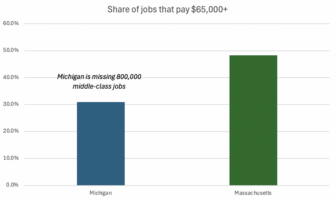As we explored in our last post, in a market economy its employers, not the government, who have the most effective levers to deal with skill shortages. Its not government or educators who are responsible for steering new entrants into the labor market to particular occupations or industries. And certainly not as a way to allow employers to keep wages low or barriers to employment high.
Two recent articles highlight practices (along with many others) by employers inconsistent with the complaints about labor shortages. A New York Times article on employers using long term internships as a substitute to hiring recent college grads. The article notes: “Once a short-term commitment at most, internships have become an obligatory rite of passage that often drags on for years.” And quotes an employer : “We need to hire a 22-22-22,” one new-media manager was overheard saying recently, meaning a 22-year-old willing to work 22-hour days for $22,000 a year.” And there is the increased utilization by employers of temporary workers as Crain’s Detroit Business reports in an article entitled Temporary workers nearing U.S. record makes Kelly Services a winner.
Neither practice is consistent with how markets deal with supply and demand imbalances. Where when supply is too low, Economics 101 teaches that you get to equilibrium by prices (in this case wages and benefits) going up. Not to mention other efforts to increase the attractiveness of what is in demand.
Two local employers have written about ways employers can deal with skill shortages. Both worth reading. In a Crain’s op ed entitled Businesses must do their part to find talent Mat Ishbia of United Shore Financial Services writes:
This positive spirit is needed to overcome the tired refrain that there’s a “skills gap” — that is, a lack of talent that matches up with employers’ needs — and that employers are powerless to do anything about it. At United Shore Financial Services, we’ve been able to successfully fill 500 positions since March 2011, and are on track to hire another 600 people this year. … There are three things in particular that employers can do to attract people with the right mix of talent and skills:
• Do our fair share of the work. Employers can’t just complain there are no skilled workers. Instead, we need to invest more of our time in finding the right graduates. If we do a better job of defining the exact skill sets we want, including “soft” areas like motivation, we can also screen more effectively. We also need to forge stronger ties with universities and community colleges, including making the effort to get to know administrators.
• Invest in supplementary training. It’s smart to look for employees who may not have all the skills they will ultimately need but who are highly motivated and willing to learn. Once you’ve found these highly motivated people, boosting your training budget for existing and new employees can then make a big difference.
• Be more flexible in creating great work environments. Our experience suggests that so-called perks can be valuable if they are extended to all employees. For example, free beverages, valet parking, concierge services and a fitness center not only help attract employees but free employees to do their best work.
In a post Nathan Hughes, responsible for recruiting at Detroit Labs, writes:
I think that worse than a skills gap, we’ve got a culture gap at companies that are looking for specific skills (i.e. resume keywords) and not finding them. I believe (know?) there are enough smart, talented, driven professionals in Michigan to fill all the jobs. But there’s not a culture in enough companies to identify and select people based on their potential, hire them, and then allow and help them learn/train/experiment/make mistakes to get them proficient in the skills. … What if we spent all our time finding the people that want our companies to succeed as much or more than we do and then trusted that drive to propel them into learning the specific fiddly bits necessary for them to succeed? (Emphasis added.)






